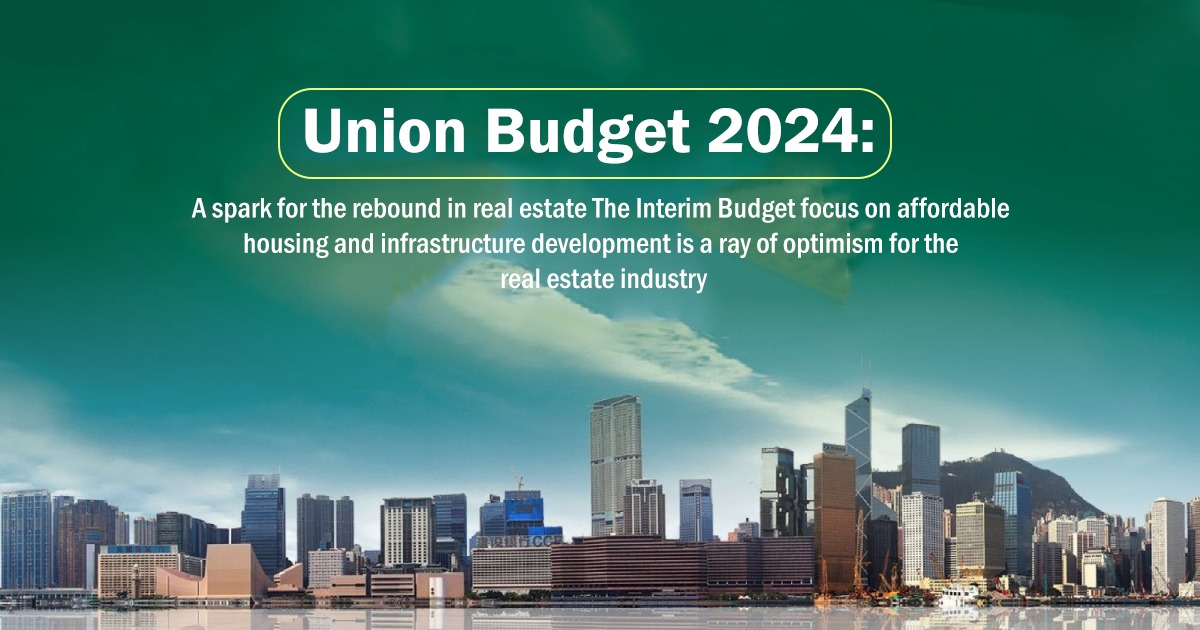Union Budget 2024: A spark for the rebound in real estate
By Bricksnwall | 2024-02-04

The real
estate industry is feeling upbeat about the government's new Interim Budget
for 2024, as industry leaders applaud the government's strategic focus on
affordable housing, infrastructure development, and economic regeneration. The
real estate sector is poised for possible change and expansion thanks to the
budget's provisions and a cautiously hopeful outlook. This news examines
the perspectives offered by significant industry players, illuminating the
expected consequences of the budgetary declarations.
The Interim
Budget's focus on affordable housing and infrastructure development is a ray
of optimism for the real estate industry. Experts predict that long-term
economic growth will be fueled by programs targeted at strengthening urban
infrastructure and connectivity, which will also increase demand for
residential and commercial real estate. It is also anticipated that policies
aimed at reducing liquidity limitations and promoting foreign investment will
draw much needed cash into the real estate industry. All things considered, the
budget presents a favorable image of the sector, providing a favorable
environment for future development and growth.
Providing
incentives to female purchasers is seen as a positive step toward empowering
women and supporting the middle-class market. This action helps to raise
overall demand in addition to increasing the number of women participating in
the real estate market. Given that women constitute a substantial portion of
the Indian economy, it is critical to carefully utilize their potential. The
budget also includes a remarkable plan to lower rental income taxes, which are
now set at a rate of 30%, which appears to be disincentive. It is expected that
a reduced tax rate on rental income will encourage investments in the rental
markets, which will be essential in closing the current housing gap, especially
in cities.
The real
estate industry is nonetheless cautiously enthusiastic about the budget's
effects, despite the good developments reflected in it. Industry leaders
emphasize that while they support initiatives like tax reforms and expanded
infrastructure spending, there has to be more clarity on regulatory frameworks
and a pressing need to solve liquidity problems. In order to realize the real
estate market's full potential and guarantee steady long-term growth and
stability, these issues must be resolved.
The real
estate industry is cheered by the budget's reaffirmation of a robust
trajectory for economic growth, which is evidenced by increased tax receipts,
doubling of the GST tax base, and a correction of the fiscal deficit. It is
anticipated that a strong economy will encourage the government to enact
additional incentives and supportive policies for mid-income housing, which is
a positive step in meeting the housing demands of a larger population. As these
initiatives inevitably result in higher demand for real estate, the dedication
to continuous infrastructure development—including plans for additional
airports, railway corridors, metro lines, and electric vehicle facilities—is
seen as a spur for higher realty demand.
To sum up, the Union Budget 2024 has shown promise as a spur for real estate industry's recovery. Although the government's emphasis on affordable housing, infrastructure, and economic revival is praiseworthy, resolving regulatory frameworks and liquidity issues will be essential to guaranteeing the industry's continued expansion. The suggested incentives for female purchasers and the possible decrease in the taxes of rental income indicate a proactive strategy to tackle particular issues within the sector. The effective execution of these budget measures is enthusiastically anticipated to pave the way for a healthy and dynamic real estate landscape in the years ahead, as the real estate market cautiously accepts the positive momentum.




